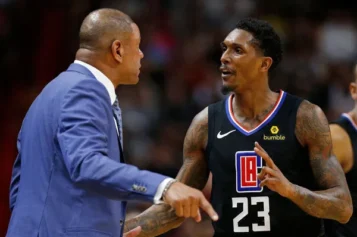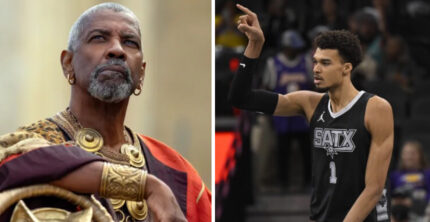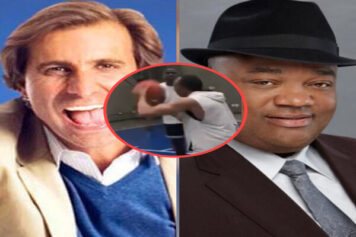You hate to hear this story, again and again. About Black people being forced out because of gentrification.
This all too common trend is at the center of the upcoming documentary Killer Bees, coming out July 27th, which follows the Bridgehampton High School basketball team of the same name as they defend their state title as their community slowly changes for the worst. Produced by NBA Hall of Famer Shaquille ONeal, the documentary is a sobering look at how the Hamptons opulent reputation is partly built on the backs of displaced middle and lower-class citizens, and how that can have deleterious effects on its storied basketball culture.
We spoke with the films directors, Ben and Orson Cummings, former Killer Bees players, about how gentrification has changed the culture of Bridgehampton and more.
KILLER BEES – TRAILER
Trailer for Killer Bees, produced by Shaquille O’Neal, to be released on August 7th. The film is about the famed basketball team in Bridgehampton that wins state titles while fighting racism, gentrification and absurd income inequality in the wealthiest region in the country: The Hamptons.
How did you guys get into the story about The Killer Bees?
Ben: First, we went to the school and played basketball in the program for junior high. A couple of summers ago, one of my classmates, coach Carl Johnson, reached out via Facebook, knew Orson and I were filmmakers, and that gentrification was making its way through the African American neighborhood. If there were ever a time to capture the team, the issues, and the culture, that time was now.
Orson: Before they’re all gone.
This school has been threatened to be shut down a number of times. But at the same time the film kind of shows that there’s a culture in the community that loves this team. How much of the area’s identity is tied to the Killer Bees?
Ben: So much. It’s important to note that the neighborhood is changing rapidly. If you go back to the 70s, 80s, and 90s, when that program, team and the population of African Americans was so much bigger, it was everything. This team, for the record, in their heyday, went and played Boys and Girls [High School Basketball Team] from Brooklyn, in Nassau Coliseum, at the Martin Luther King [Jr] Classic and beat them. They were like the Knicks.
Then this community exploded into the Hamptons and became this whole different place, and as that has happened, things have changed. The talent pool is drying up, as real estate has become so valuable you can’t be a working class or modest income person out here anymore, which means the Black community are moving back down south, or to Riverhead, [NY].
Coming to theaters in NYC & LA on July 27th, produced by Shaquille O’Neal, Killer Bees tells the story of the legendary Bridgehampton High School hoops team that’s won more State titles than any program. https://t.co/K8cc8Z1dcH
#RealHamptonsFive. @Shaq
@TheSteinLine
pic.twitter.com/nsa2l25oM3Killer Bees (@killerbeesmovie) June 14, 2018
Since someone brought the story to you two, and yall went to the school, you have a certain connection to it. Did the final product meet your expectations?
Ben: Yes and no. We followed them as they were preparing to defend their most recent state title that they won with the help of Charles Manning, their best player. He’s 6’5 and a serious Division I prospect. While we were waiting for Coach Johnson for our very first meeting, we picked up the local paper, and on the cover was the news that Charles had left Bridgehampton to go to Long Island Lutheran, which is a basketball factory
Orson: It was supposed to be an easy repeat championship [doc], because they won the year before with Charles. But, Charles’ father was a big-time player, some say the best player in the history of the entire program, along with Troy Bowe or Carl Johnson. That’s the big debate. When Charles left, it became a more interesting story, in a way, because then the role players had to coalesce and form a team. They became the underdog again. They had to come together in a way that was more interesting as a film.
I think one of the hallmarks of the doc is the juxtaposition between showing how much the team means to the community and real estate broker Vince Horcacitas, who’s just gushing about how much new development is coming in. How did you balance showing those extremes?
Orson: We knew we wanted to capture that. We wanted to give people the lay of the land, for people who have never been here. Instead of putting a map of the screen, we wanted someone to give us a driving tour. We were sitting there doing an interview with the elderly woman who is the number one fan. We had just wrapped up the interview and we looked at each other and asked: “who are we going to get to do that guided tour.” Then a Maserati pulls up with that blaring engine, and out came Vince, who we both kind of knew from living out here. He walked up to us, asked us what we were doing, and then offered us a tour. [Laughs] He was sort of totally unaware. He didn’t have any awareness that what he was saying would be interpreted as bad or a negative influence. He was just explaining how it really is, and it is truthful. But it’s also pretty shocking.
I don’t want to paint him as the villain, but I wonder if he knew he was a being a purveyor of all the things that are threatening the Killer Bees.
Ben: I think one of the things Vince and his personality reveals, is that he’s not necessarily malicious. He just doesn’t appreciate the collateral damage of what it is he does.
Orson: It speaks a little bit, I think, to a force you’ll see in a lot of places, whether it’s New York City or around the country, which is an unbridled free market. He represents that force. That’s our country. That’s our system.
With the Hamptons bringing in all of this money from real estate developments, why do you think that money isn’t going into the Killer Bees program, even with their national title?
Orson: That’s very simple. It’s because it’s out here in the Hamptons, and these are people’s second, or even third homes. They don’t live here for the majority of the year and they don’t have children in the schools. So, they don’t have the same relationship to the educational system, the team, or the local community.
So, who’s trying to push out the school?
Ben: Well going back in time, when those fights that are represented in the film, including the one when the school was actually closed, it was a direct battle between the local residents and the second homeowners, who were generally white. The local residents were generally Black. However, recently, the school survived those fights, and as Bridgehampton gentrified, there are actually more white and latin students going to the school now. The demographics changed. The school recently floated a big bond. They’re going to stick around, and grow this school. The school is going to survive, but the question is what will the culture now be at the school?
Orson: That’s definitely going to change.
Ben: That’s definitely going to change.
Why will the culture change?
Ben: Because poor, working-class people are going to have to move out of town, and wealthy, generally whiter kids are going to move in. There are plenty of nice kids that’ll end up going there, and lovely teachers. But, there’s just not going to be as many African Americans there as there used to be. The team won’t be what it was.
Orson: It won’t be the kids who play 8 hours a day on the court at the Child Care Center. That’s the thing, they’re going to be playing video games, and lacrosse, and soccer, and it’ll just be other stuff.
One of the more startling scenes in the film is when two players discuss the merits of wealth distribution. From your time with the players, what do you think is their general feeling towards what is happening to their community?
Ben: I would say the general sense, to be honest, is detachment. They go back and live in an isolated existence in their own world in that school. They’re very happy there, and they’ve created a quintessential perfect American environment with all of these different races mixed, and the teachers are great. It’s when you leave that little environment, or they graduate. Then it’s ‘What’s the plan now? You can’t stay in that school anymore, and that safe zone. They often aren’t prepared to deal with it.
Orson: They’ve also clearly have given this some thought.
Ben: There’s an overall cynicism, I’d say, of a lack of belief that the system is going to work for them, overall.
You guys also did a really good job of showing a sort of pipeline from the school to prison. Do you feel like gentrification, and as you said, the culture completely changing, will cause more players and young Black men to become criminals?
Ben: It’s certainly possible. I think things are a little better. The fellow Julian Johnson, who we interviewed in prison, I think he was part of the height of the crack era, a more drug-infused, dangerous time than today. Sometimes they’re not always ready to go away to college. If you live in a really small town, it’s definitely hard.
Orson: There are stories of the kids who were in the film. It’s very hard when they go to college. They’ll usually go for a year. Then finances, travels or other issues happen, and they bail. Then, yeah, what do you do now? We’re worried about it. I hope this film reflects that we’re worried about it.
Shaquille O’Neal is a producer on the film. How involved was he in the making of this film?
Ben: He got involved early. We did the first fundraising for a small amount. Then we had a trailer that we cut and showed it to Glenn Fuhrman, who was the executive producer. Glenn is a huge basketball fan, and he knows Shaq. Glenn showed it to Shaq, and Shaq responded right away. Making a movie with Shaq involved is different than just making a movie [Laughs]. He hadn’t come out [to Bridgehampton] in a long time and he had no idea, just like everyone else, that there’s a championship team here. He really created a lot of awareness from the beginning and gave it a large boost.
Most of the people who play in the NBA are African-American. Do you think that gentrification can get so widespread across America and so that the culture of the NBA is affected?
Ben: For sure. The amount of effort it takes from so many people to get a young boy to a Division I scholarship and through college, it takes, like Carl said, two vans loaded with people working around the clock to help him achieve that goal. The more difficult it gets with gentrification or the criminal justice system, the harder it is, even for the most gifted athletes, to get that far.



